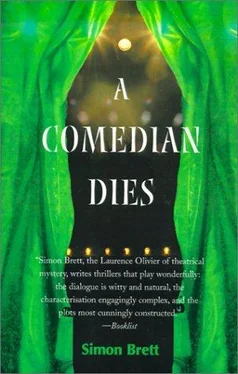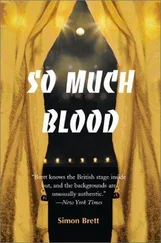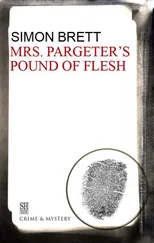Simon Brett - A Comedian Dies
Здесь есть возможность читать онлайн «Simon Brett - A Comedian Dies» весь текст электронной книги совершенно бесплатно (целиком полную версию без сокращений). В некоторых случаях можно слушать аудио, скачать через торрент в формате fb2 и присутствует краткое содержание. Жанр: Классический детектив, на английском языке. Описание произведения, (предисловие) а так же отзывы посетителей доступны на портале библиотеки ЛибКат.
- Название:A Comedian Dies
- Автор:
- Жанр:
- Год:неизвестен
- ISBN:нет данных
- Рейтинг книги:5 / 5. Голосов: 1
-
Избранное:Добавить в избранное
- Отзывы:
-
Ваша оценка:
- 100
- 1
- 2
- 3
- 4
- 5
A Comedian Dies: краткое содержание, описание и аннотация
Предлагаем к чтению аннотацию, описание, краткое содержание или предисловие (зависит от того, что написал сам автор книги «A Comedian Dies»). Если вы не нашли необходимую информацию о книге — напишите в комментариях, мы постараемся отыскать её.
A Comedian Dies — читать онлайн бесплатно полную книгу (весь текст) целиком
Ниже представлен текст книги, разбитый по страницам. Система сохранения места последней прочитанной страницы, позволяет с удобством читать онлайн бесплатно книгу «A Comedian Dies», без необходимости каждый раз заново искать на чём Вы остановились. Поставьте закладку, и сможете в любой момент перейти на страницу, на которой закончили чтение.
Интервал:
Закладка:
‘It’s possible.’
‘The coroner didn’t seem to think so.’
‘No, but I happen to know that Peaky did test out his equipment as usual that day.’
Barber registered genuine surprise at that. ‘How on earth did you find that out?’
‘Norman del Rosa saw him. For reasons of his own he didn’t want to tell the police.’
‘I can guess the reasons of his own. He was off stealing the dancers’ knickers.’
‘Not far off.’
‘So, what. . you reckon someone fiddled with the electrics after Peaky had tested them?’
‘Again, it’s possible.’
‘But how?’
‘Haven’t got that far yet.’
‘Hmm. I think you may be on a wild goose chase. That theatre’s electrics were so ropey nothing would surprise me about them. I would imagine whatever the fault was just came and went.’
‘Maybe.’
‘But anyway, your suspicions are heading towards Janine at the moment?’
‘As she had been having an affair with him and had a major row on the day of his death, she would seem to have some sort of motive.’
‘Yes. Mind you, who didn’t? I don’t think there was a single person in that company whose back he hadn’t got up at some point. He was bloody rude to everyone — all the dancers, the pop group lot, that miserable little pianist. Even poor old Walter. He’d been hanging round for some time trying to get a telly show going, but Peaky treated him like dirt, kept saying he was getting better offers from the other companies, that sort of line.’
‘Oh, so Walter had been down to see the show before that day?’
‘Oh yeah, three or four times.’
‘I see. But going back to Janine. .’
‘Sorry. Don’t think I can help you. Never even knew her address.’
‘She’s moved anyway, but I thought you might know some of her friends or. .’
‘Don’t know she had any. You could try the rest of the group, I suppose. No, she was a funny little thing. Very quiet. Apparently lived with this boyfriend in London, but nobody never knew his name. I gather the entry of Prince Bloody Charming Bill Peaky into her life really confused her. Should she give up boy-friend? Should she even tell boy-friend? You know how screwed up kids get about that sort of thing.’
He spoke as if people who got upset about sexual matters belonged to an alien race. The whisky glass was filled again and emptied.
Charles was back where he started. Barber’s comments had told him nothing new about Janine. They had opened up possibilities for investigation of other characters involved in Sun ’n’ Funtime, but Charles found it difficult to concentrate on more than one suspect at a time. Until he had seen Janine, any other course of inquiry seemed a bit futile. Once she had been eliminated. . Even as he thought it, the word ‘eliminated’ took on sinister overtones. What had happened to Janine Bentley?
The producer of the show arrived with the dishy researcher. Lennie Barber slumped back into his posture of glazed incapacity.
‘All set?’ asked the producer with imposed joviality. (Incidentally, the producer was not Walter Proud, who, though responsible for the original idea of recreating the Barber and Pole routine, seemed since to have been pushed into the background.)
‘Set? I’m as set as a bloody blancmange, thank you.’ Lennie Barber rose to his feet expansively, then seemed to lose his balance and sank back, arms windmilling, onto the side of his chair. Chair and comedian collapsed in a sprawling heap on the floor. The producer and the dishy researcher hastened forward to scoop Barber up.
‘Are you going to be all right for the show?’ The acid in the producer’s tone was trickling straight down to his stomach to feed his incipient ulcer.
‘No problem.’ Lennie Barber oriented himself towards the door and got through it, hardly hitting the frame at all.
Ignoring Charles, the producer and the dishy researcher scuttled after. As they passed, he heard them muttering, ‘Thank God we keep that interview with Greg Robson in reserve. Just need a quick announcement from continuity about a change to the scheduled programme.’
Alexander Harvey’s high viewing figures did not exactly reflect his personal popularity. Indeed, many of the people who watched the programme did so merely to confirm how much they disliked him. Being the host on a chat-show is, by its nature, a thankless task, because everyone tunes in to see the guests rather than the presenter anyway, and the host has the options of either keeping a profile low to the point of anonymity or high to the point of irritation. Alexander Harvey had chosen the latter course.
Sometimes this paid handsome dividends. He was very good at stimulating the reticent and cutting short the long-winded, and often the guests, in sheer exasperation at the manner of his questioning, made newsworthy indiscretions. Also he was clever — no one denied that — and was quick at picking up nuances or spotting potentially interesting new directions for the conversation.
His approach also had disadvantages. Apart from the obvious one that the viewing public, who didn’t basically like him, were constantly having their attention drawn back to him, he sometimes tended to cut short an interviewee too early into an anecdote and not to allow his victims to pace the conversation to their own style.
He was also ‘very into’ The Arts and considered his guests on a sliding scale of esoteric snobbery. Opera stars he held in highest esteem, breathing adulation over them with every word. Other classical musicians got a fairly high rating. Theatrical knights and dames scored well, though the rest of the acting profession came rather lower down the scale. Authors and playwrights were OK, so long as they weren’t too successful with the public. Popular singers had to have unexpected sidelines to rate anything other than contempt. And comedians. . Well, comedians were there to be patronized with ill-disguised disgust.
Though that was the basic outline of his scale of values, there were other variables which made predictions of his treatment of a guest difficult. For instance, Hollywood cast a special glow. Any performer, however terrible, who had appeared in some black-and-white ‘B’ feature in the forties and who could drop the names of a couple of superannuated directors, immediately shot up the league. Being American also improved the credit rating. And being old was an enormous asset. The older the better. Old people gave Alexander Harvey the opportunity to show (a) How good he was with old people; (b) How well he (or in fact one of his researchers) had researched his guest’s career; and (c) How important Alexander Harvey was to have such venerable figures chatting to him in such a convivial manner.
So to receive optimum treatment on the Alexander Harvey Show a guest should be a hundred-year-old American opera singer who had made a lot of Hollywood films in the course of a long and anecdote-littered career.
Exactly where all this left Lennie Barber, Charles was not certain, but everything pointed to a patronizing roasting. The only plus point the comedian had on the Alexander Harvey scale was age, and he didn’t really have that in sufficient quantity. Lennie Barber was only sixty-two and Alexander Harvey came into his own with octogenarians and nonagenarians. And, Charles discovered from the dishy researcher, Barber also suffered a big minus — he had been someone else’s idea. It should have been mentioned that theideal hundred-year-old opera singer must have been suggested for the show by Alexander Harvey himself.
Charles lurked round the back of the set as the interview started and watched events on a black-and-white monitor. It was clear from his first words that Alexander Harvey was in a carving-up mood. His introduction was couched in a camp sneer. He gave exactly the sort of information that Barber would have hated. ‘. . whom you may remember from the forties and fifties when he was very successful in the apprentice days of television. Unfortunately, with the death of Wilkie Pole, the act was over and public taste seemed to change. However, we are delighted to say that he is still a working comedian and it’s a great privilege for me to welcome tonight — Mr. Lennie Barber!’
Читать дальшеИнтервал:
Закладка:
Похожие книги на «A Comedian Dies»
Представляем Вашему вниманию похожие книги на «A Comedian Dies» списком для выбора. Мы отобрали схожую по названию и смыслу литературу в надежде предоставить читателям больше вариантов отыскать новые, интересные, ещё непрочитанные произведения.
Обсуждение, отзывы о книге «A Comedian Dies» и просто собственные мнения читателей. Оставьте ваши комментарии, напишите, что Вы думаете о произведении, его смысле или главных героях. Укажите что конкретно понравилось, а что нет, и почему Вы так считаете.












